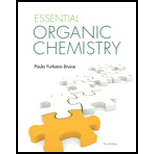
Essential Organic Chemistry (3rd Edition)
3rd Edition
ISBN: 9780321937711
Author: Paula Yurkanis Bruice
Publisher: PEARSON
expand_more
expand_more
format_list_bulleted
Question
Chapter 13.4, Problem 11P
Interpretation Introduction
Interpretation:
Alkylation of
Concept introduction:
Alkylation of
Expert Solution & Answer
Want to see the full answer?
Check out a sample textbook solution
Students have asked these similar questions
Show the products when the following reagents react.
In the following reaction, which chemical species is acting like a nucleophile?
What explains why many aldehydes and ketones can undergo self- condensation reactions in basic conditions?
The alpha carbon can lose a proton and act like a nucleophile and the carbonyl carbon a an electrophile
O The alpha carbon can gain a proton and act like an electrophile and the carbonyl carbon is a nucleophile
O The oxygen of the carbonyl group can attack the carbon of the carbonyl group
Only esters can undergo self-condensation reactions
Chapter 13 Solutions
Essential Organic Chemistry (3rd Edition)
Ch. 13.1 - Identify the most acidic hydrogen in each...Ch. 13.1 - Prob. 2PCh. 13.1 - Prob. 3PCh. 13.1 - Prob. 4PCh. 13.1 - Explain why HO cannot remove a proton from the...Ch. 13.2 - Prob. 6PCh. 13.2 - Prob. 7PCh. 13.3 - Prob. 8PCh. 13.3 - Prob. 9PCh. 13.3 - Prob. 10P
Ch. 13.4 - Prob. 11PCh. 13.5 - Prob. 12PCh. 13.5 - Prob. 13PCh. 13.6 - Prob. 14PCh. 13.7 - Prob. 16PCh. 13.8 - Prob. 17PCh. 13.8 - Prob. 18PCh. 13.8 - Prob. 19PCh. 13.9 - Prob. 20PCh. 13.10 - Propose a mechanism for the formation of...Ch. 13.10 - Prob. 22PCh. 13.10 - a. If the biosynthesis of palmitic acid were...Ch. 13 - Draw the enol tautomers for each of the following...Ch. 13 - Number the following compounds in order from...Ch. 13 - Prob. 26PCh. 13 - Explain why the pKa of a hydrogen bonded to the...Ch. 13 - Prob. 28PCh. 13 - Prob. 29PCh. 13 - Prob. 30PCh. 13 - Prob. 31PCh. 13 - Prob. 32PCh. 13 - Prob. 33PCh. 13 - Using cyclopentanone as the reactant, show the...Ch. 13 - Prob. 35PCh. 13 - Prob. 36PCh. 13 - Prob. 37PCh. 13 - Prob. 38PCh. 13 - Prob. 39PCh. 13 - Prob. 40PCh. 13 - Prob. 41PCh. 13 - Prob. 42PCh. 13 - Prob. 43PCh. 13 - Prob. 44PCh. 13 - Describe how the following compounds can be...Ch. 13 - Prob. 46PCh. 13 - Which would require a higher temperature:...Ch. 13 - Prob. 48PCh. 13 - Propose a mechanism for the following reaction:Ch. 13 - Show how the following compounds could be...Ch. 13 - Prob. 51PCh. 13 - Prob. 52P
Knowledge Booster
Similar questions
- Draw the major product of the reaction. OH NaH H2 NaBr + C6H100 DMF "Br +arrow_forwardAcetal product formation requires an acid catalyst in the second step, but NOT in the first step. True or False?arrow_forwardA "condensation" reaction involves the loss of a small neutral molecule as a follow-up step to an addition reaction. The product is an a,ß-unsaturated aldehyde (or ketone). (*In aldol condensations, the small neutral molecule is water.) Which of the three products shown is the correct aldol condensation products of the reaction shown. Write the mechanism for the dehydration step. Assume the reaction mixture still contains catalytic base. OH NaOH H O adol addition = enolates + aldehyde loty Condensation H or OH or H (H₂O + OH)arrow_forward
- Select the structure of the major product in the following reaction. CH,CO0OHarrow_forwardThe Wittig sequence includes this/these reaction step/s. O nucleophilic substitution of a phosphine on an alkyl halide O acid-base reaction removing a hydrogen from the carbon next to the phosphonium group to form an ylide O the aldehyde or ketone combines with the ylide to form an oxaphosphetane O the oxaphosphetane breaks down to form the alkene and a phosphine oxide O all of the above O none of the abovearrow_forwardFor the following step in a reaction, use arrows to show how the end product is achieved.arrow_forward
arrow_back_ios
SEE MORE QUESTIONS
arrow_forward_ios
Recommended textbooks for you
 Organic Chemistry: A Guided InquiryChemistryISBN:9780618974122Author:Andrei StraumanisPublisher:Cengage Learning
Organic Chemistry: A Guided InquiryChemistryISBN:9780618974122Author:Andrei StraumanisPublisher:Cengage Learning

Organic Chemistry: A Guided Inquiry
Chemistry
ISBN:9780618974122
Author:Andrei Straumanis
Publisher:Cengage Learning